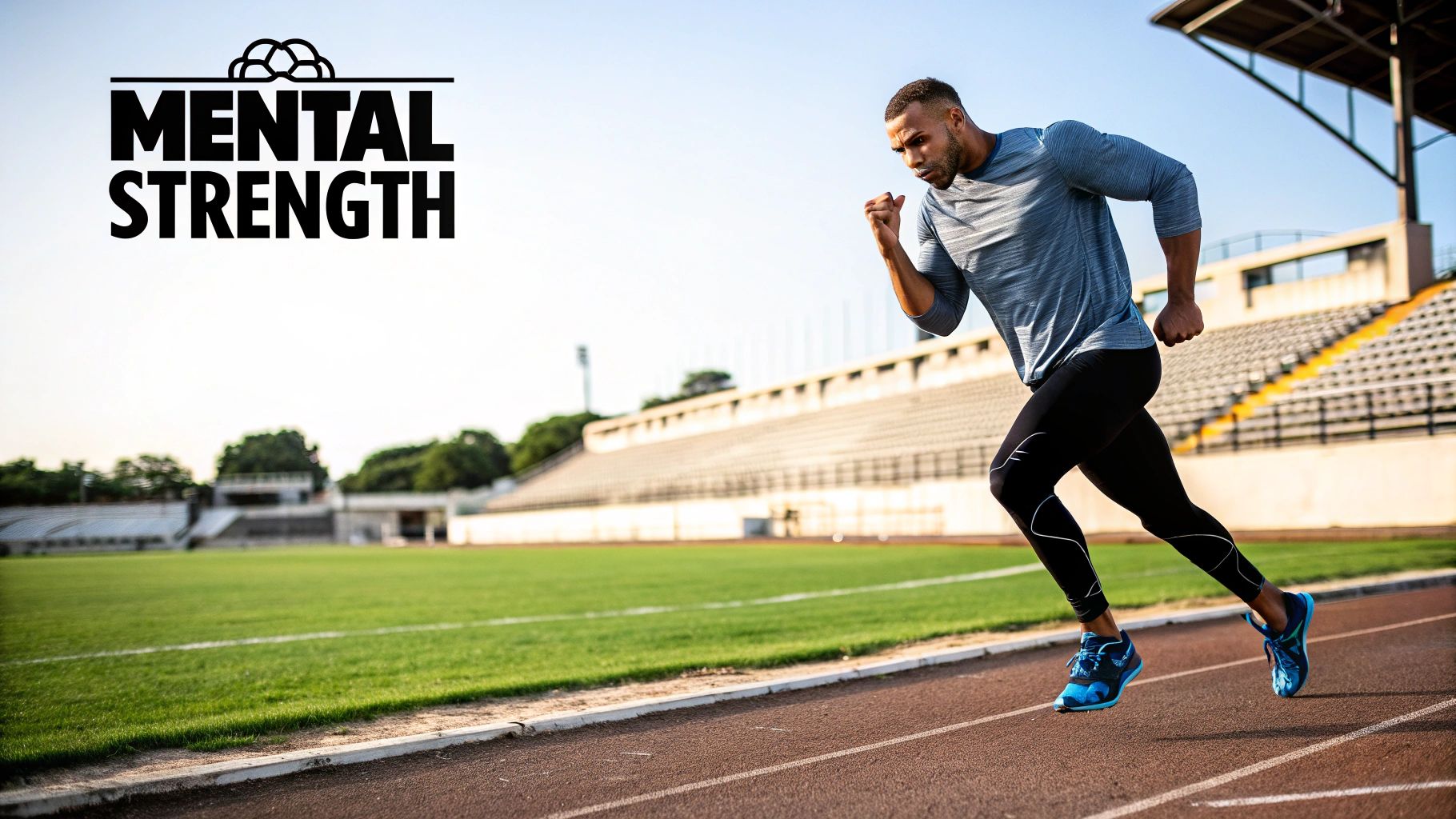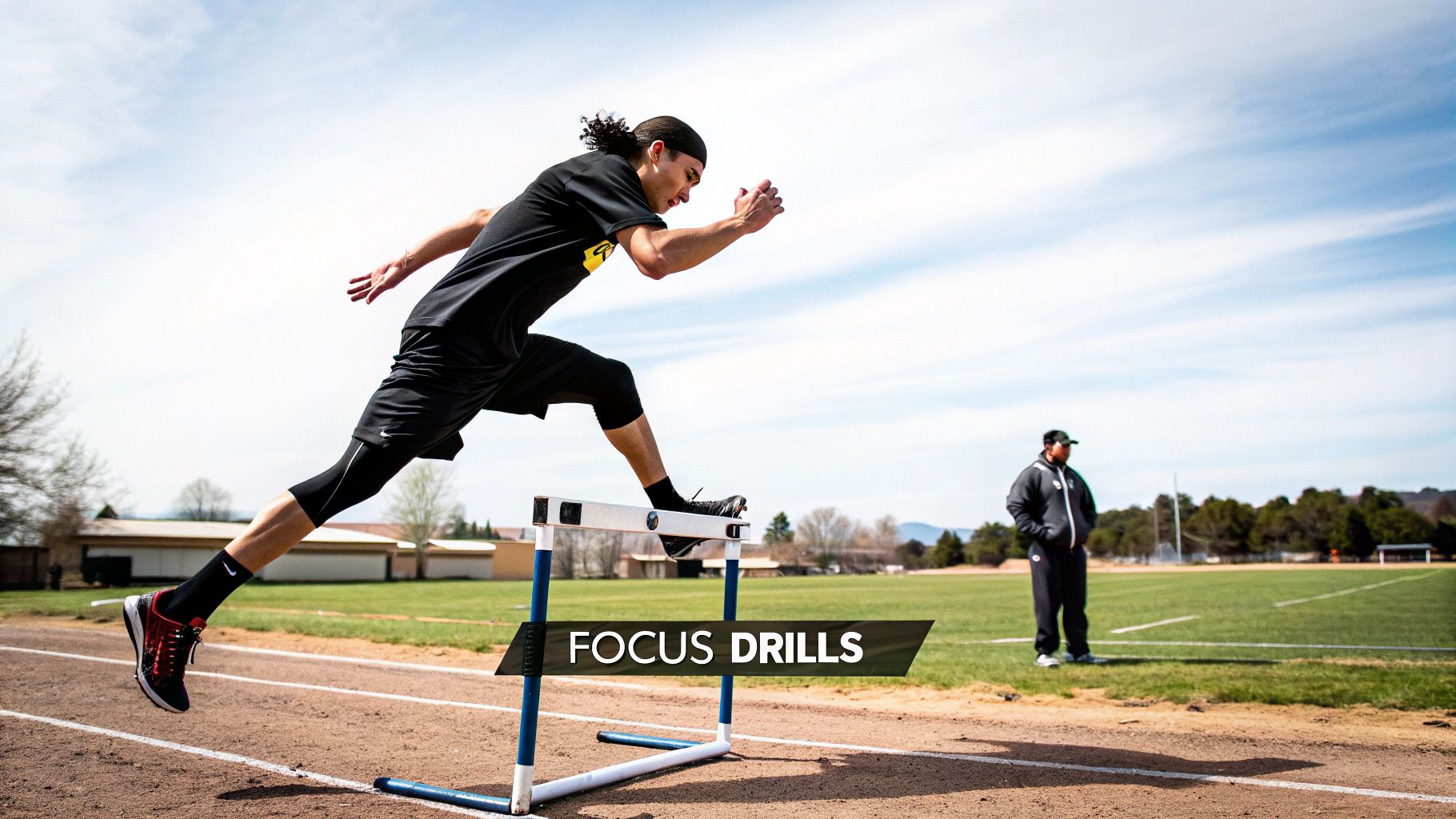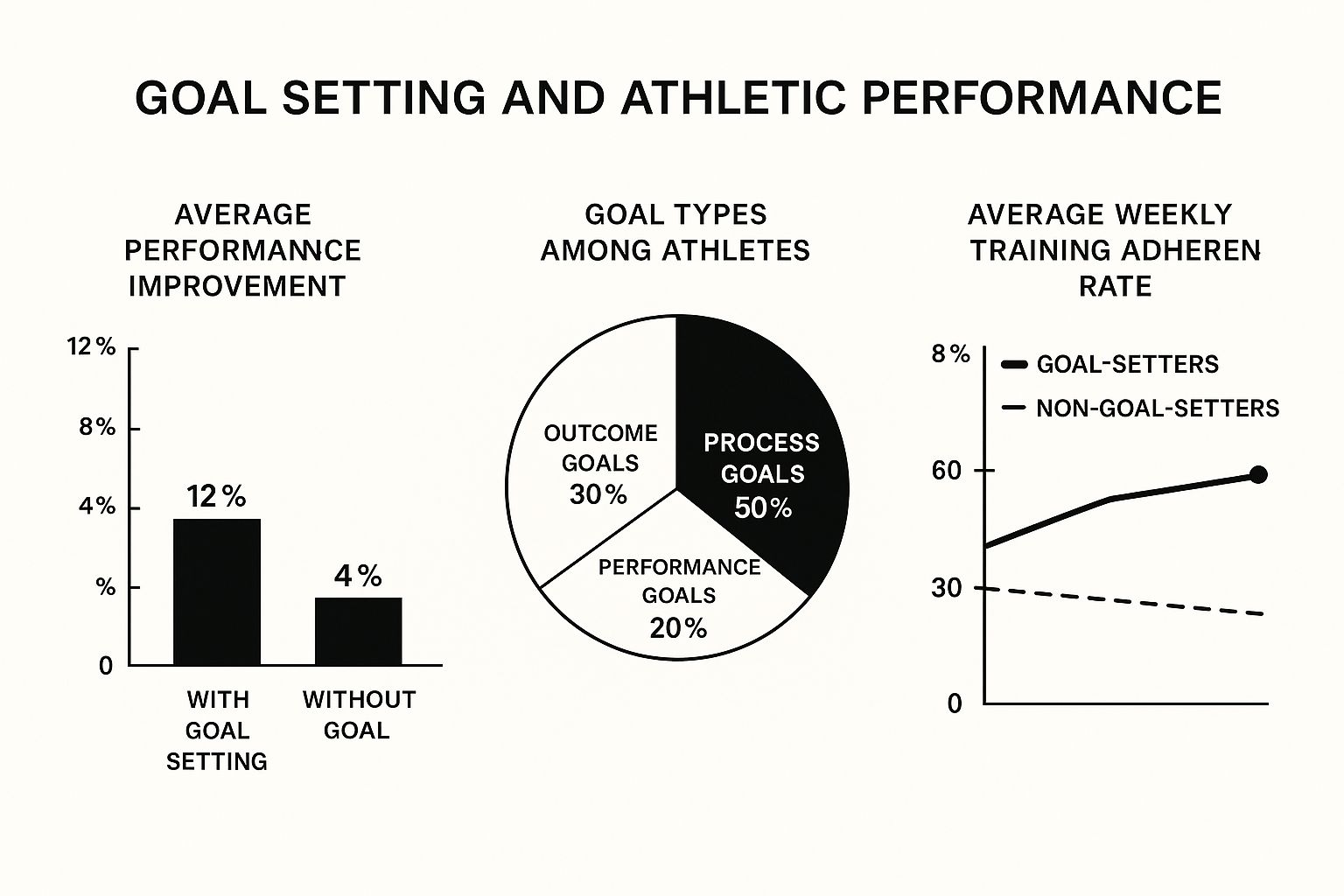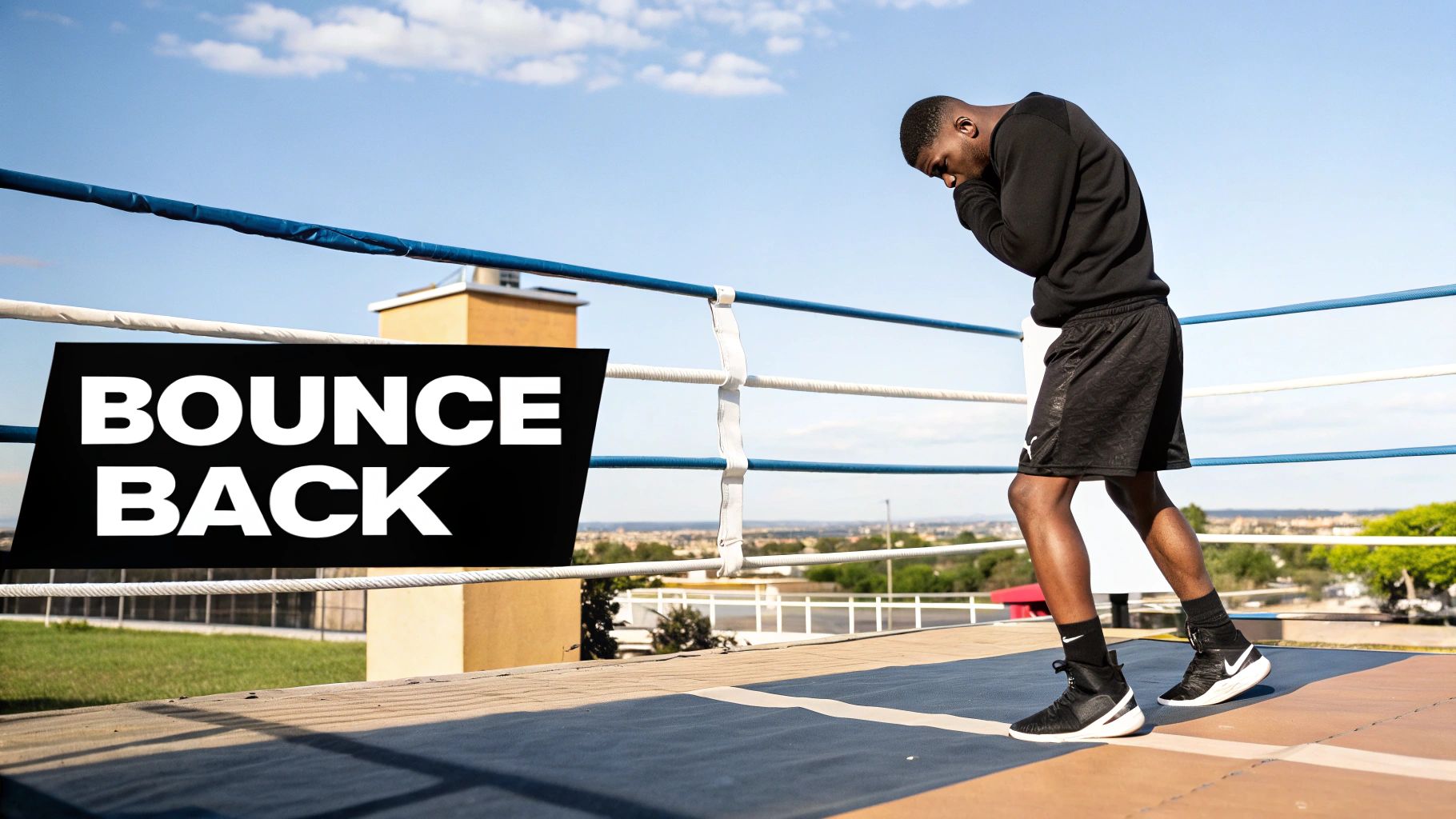Boost Your Performance with Mental Toughness for Athletes
- Epic Brilliance
- Jul 13, 2025
- 14 min read
When we talk about mental toughness in sports, what are we really getting at?
It’s that crucial ability to show up and perform at your absolute best, no matter what’s happening around you. Think about it—it’s the psychological edge that keeps you determined, focused, and in control, even when the pressure feels crushing. This quality is often what separates the good athletes from the truly great ones.
What Mental Toughness Really Means in Sports
I like to think of mental toughness as the suspension system on a high-performance race car. The engine—your physical skill—gets all the glory, but it's the suspension that really dictates how the car handles the track. It's the unseen force that absorbs the shocks from unexpected bumps, keeps the car stable through hairpin turns, and allows the driver to stay in control at top speed.
Without a solid suspension, even the most powerful engine is useless on a tough course. In the same way, an athlete without mental toughness might have all the physical gifts in the world, but they'll crumble under the intense pressure of a real game. It's the invisible engine that powers you through when everything is on the line.
The True Mark of an Elite Athlete
Mental toughness isn't about being a robot or never feeling nervous. That's a huge misconception. It’s actually about acknowledging those feelings and performing effectively in spite of them. It’s the laser focus of a golfer standing over a putt to win the championship, somehow blocking out the crowd and the weight of the moment. It’s the calm, clutch decision-making of a quarterback in the final two minutes of a tied game.
This quality shows up in a few key ways:
Resilience: How quickly can you bounce back from a mistake, a bad call, or a deficit without letting it torpedo your entire performance? That’s resilience.
Confidence: It's that unshakeable belief in your skills and preparation, even when you're up against a tough opponent or things aren't going your way.
Focus: This is your ability to tune out all the noise—both external (like a screaming crowd) and internal (like that nagging voice of self-doubt)—and stay completely locked in on your job.
Motivation: It’s that deep, internal fire that drives you to push through physical pain and mental exhaustion to chase down your goals.
To give you a clearer picture, coaches and sport psychologists often break mental toughness down into what they call the "4 Cs." It's a fantastic framework for understanding the different pieces you need to build.
The Four Cs of Mental Toughness
Component | What It Means for an Athlete | In-Game Example |
|---|---|---|
Commitment | Having a deep sense of purpose and sticking to your goals, even when it's hard. It's about showing up for the gritty, unglamorous work every single day. | A swimmer waking up for 5 AM practice all winter, driven by the goal of qualifying for the national championships. |
Control | The ability to manage your emotions and focus. It means staying calm under pressure and not letting external factors (like a referee's call) dictate your mindset. | A basketball player missing two free throws, but then calmly sinking the next two to seal the game, rather than getting flustered. |
Challenge | Viewing difficult situations and setbacks as opportunities to grow, not as threats. You embrace the challenge and see pressure as a privilege. | A tennis player going down a set but seeing it as a chance to adapt their strategy and prove they can fight back. |
Confidence | An unshakable belief in your ability to execute your skills and achieve your goals. This isn't arrogance; it's a quiet trust built on preparation. | A soccer player stepping up to take a penalty kick in a shootout, fully believing they are going to score. |
Seeing these components laid out makes it clear: this isn't some abstract concept. It's a set of distinct, interlocking skills that anyone can work on.
Mental toughness is not a magical gift bestowed upon a select few. It is a trainable, psychological skill set that can be systematically developed through dedicated practice, just like any physical skill.
For any athlete who's serious about their craft, building this mental fortitude is just as vital as strength training or cardio. It's the scaffolding that supports all your physical talent, letting you tap into your full potential when it matters most.
From the tennis player fighting back from two sets down to the marathon runner hitting "the wall" at mile 20, mental toughness is the force that wills them to keep going, to fight, and ultimately, to win. It’s what turns raw physical potential into undeniable competitive reality.
The Science Behind a Resilient Athletic Mind

While we often talk about mental toughness as if it’s some kind of superpower, it’s not magic. It’s actually deeply rooted in psychological principles we can understand and, more importantly, train. When you pull back the curtain on what's happening in your brain, it stops being a vague concept and becomes a concrete skill you can build.
At its heart, developing mental toughness means getting a handle on a few key cognitive and emotional functions. These aren't inborn talents—they're trainable brain processes. We're going to break down attentional control, emotional regulation, and self-efficacy, because these are the gears that turn when you’re under pressure.
Mastering Your Internal Spotlight
Let’s talk about attentional control. Think of it like being the spotlight operator in a huge theater. Your performance is what's happening on stage, but there are a million distractions vying for your attention—the roar of the crowd, replaying a mistake in your head, worrying about the final score.
A mentally tough athlete has trained their internal "spotlight operator" to keep the beam locked onto the action. This is the skill of consciously directing your focus to what matters right now, whether that’s the next play, the next breath, or the next stride. When your mind wanders, you have the ability to gently but firmly pull that spotlight back where it belongs. It’s not about pretending distractions don’t exist; it's about choosing not to feed them your energy.
The essence of mental toughness is not the absence of pressure or distraction, but the learned ability to maintain executive control over your focus and emotions when it matters most.
This ability to direct your attention is what separates good from great, allowing you to execute your skills almost on autopilot, without getting thrown off by all the noise.
Harnessing Your Emotional Engine
Next up is emotional regulation. Every single athlete feels that surge of nerves and adrenaline before a big game. That’s just your body's natural stress response—the classic "fight-or-flight" mechanism—doing its job. An athlete who hasn't trained this skill might feel that surge and interpret it as panic, letting it completely overwhelm them.
But a resilient athlete learns to see it differently. They recognize that the physical signs of anxiety—a racing heart, tunnel vision, heightened senses—are almost identical to the signs of excitement. By simply relabeling "I'm nervous" as "I'm ready," they can flip a switch in their brain. Suddenly, that nervous energy becomes high-octane fuel, turning a potential threat into a massive performance advantage.
This isn’t just theory; it’s backed by research into what makes elite performers tick. A study of ultra-endurance athletes in the grueling Marathon des Sables, for example, found they had significantly lower levels of anxiety than the general population. It’s not that they don’t feel stress; it’s that they’ve developed expert coping strategies to thrive under it. You can dive deeper into their psychological profiles by reading the full study.
Building Unshakeable Self-Belief
Finally, the science points to the power of self-efficacy. This term, coined by psychologist Albert Bandura, is more than just feeling confident. It's the rock-solid, evidence-based belief that you have what it takes to succeed in a specific situation. It’s the conviction, earned through hard work, that you can perform the actions needed to get the job done.
You build this unshakeable belief brick by brick. Here's how:
Mastery Experiences: Every time you successfully execute a skill in practice, you lay another brick in your foundation of belief. Repetition builds competence, and competence builds conviction.
Vicarious Experiences: Watching a teammate or another athlete succeed can powerfully reinforce the idea that, "If they can do it, so can I."
Verbal Persuasion: Honest, credible encouragement from a coach or teammate you trust can give you that extra push, reinforcing your own belief in your abilities.
These three components—attentional control, emotional regulation, and self-efficacy—are the psychological pillars of resilience. By training your internal spotlight, learning to channel your emotional energy, and methodically building your self-belief, you are quite literally rewiring your brain for peak performance. That's the science that powers the mentally tough athlete.
Building Your Mental Fortitude with Practical Strategies

Knowing the science behind a resilient mind is one thing, but actually building that resilience is where the real work—and the real change—happens. This is where theory hits the turf. Developing mental toughness isn't about waiting for a high-pressure moment to see if you have what it takes. It’s about forging that strength, day in and day out, through deliberate practice.
Think of it like a blacksmith forging a sword. A strong blade isn't made in a single strike. The metal is heated, hammered, and cooled over and over again. Your mental fortitude is built the same way: through the consistent application of specific techniques that prepare you for the heat of competition. These aren't just quick fixes; they're fundamental skills for your mental toolkit.
Hardwire Success with Visualization
One of the most powerful tools an athlete has is visualization, or what some call mental rehearsal. This is the practice of vividly imagining yourself executing your performance down to the last detail. It's so much more than daydreaming; it’s a focused, multi-sensory experience that primes your brain and body for success. In fact, studies show that when you vividly visualize an action, your brain fires up the exact same neural pathways as if you were physically doing it.
To get started, find a quiet spot where you won’t be disturbed. Close your eyes and start building the scene in your mind.
Engage All Your Senses: Don't just see the performance, truly feel it. Feel the grain of the basketball in your hands, smell the freshly cut grass of the field, hear the roar of the crowd, and even taste the salt from your own sweat.
Imagine Flawless Execution: See yourself moving with perfect form, making split-second smart decisions, and nailing your desired outcome. Picture yourself sinking the game-winning free throw or crossing the finish line feeling strong.
Rehearse Bouncing Back: Don't just visualize everything going perfectly. Throw a wrench in the works. Imagine a setback—a missed shot, a bad call from the ref—and then vividly see yourself responding with total composure, instantly refocusing on the very next play.
This practice gives you priceless "reps" without any of the physical wear and tear. It builds a deep, unshakeable confidence because, in your mind, you've already succeeded hundreds of times before you even step into the arena.
Reframe Your Inner Dialogue
Every single athlete has an inner critic. It's that nagging voice that pipes up with doubt and frustration after a mistake. The secret to mental toughness isn't about silencing that voice—it's about learning how to manage it. This is a skill called positive self-talk, and it’s about consciously shifting your internal monologue from criticism to constructive coaching.
So, instead of fumbling the ball and immediately thinking, "I can't believe I did that, I'm awful," you intentionally reframe it. A mentally tough response sounds more like, "Okay, that wasn't my best. Focus on my grip, watch the ball all the way in next time. I got this." That small shift changes everything.
Key Insight: Your self-talk is the running commentary of your performance. By taking control of the script, you can turn your biggest critic into your most valuable ally.
This isn’t about lying to yourself or being blindly positive. It’s about realistic, task-oriented feedback that keeps you locked on solutions instead of dwelling on problems. It's a cornerstone of maintaining control—one of the core components of mental toughness.
Anchor Yourself with Mindfulness
In those high-stakes moments, adrenaline can feel like it's hijacking your performance. Your heart starts racing, your mind scatters, and you lose your edge. Simple mindfulness and breathing exercises are your anchor, pulling you right back to the present moment and calming that physiological stress response.
The most accessible tool you have is box breathing. It’s a dead-simple technique you can use anywhere, anytime—on the sideline, between sets, or before you step up to the plate.
Inhale: Breathe in slowly through your nose for a count of four.
Hold: Hold that breath for a count of four.
Exhale: Breathe out slowly through your mouth for a count of four.
Hold: Hold at the bottom of the exhale for a count of four.
Repeat this cycle 3-5 times. This rhythmic pattern signals to your nervous system that you are safe and in control, helping to lower your heart rate and clear the mental fog. These strategies—visualization, self-talk, and breathwork—are the practical, roll-up-your-sleeves building blocks of mental fortitude. By weaving them into your daily training, you move from just understanding mental toughness to truly living it.
Who Excels with Mental Toughness and Why
The impact of mental toughness on an athlete's career isn't just the stuff of locker-room speeches and inspirational montages. It's a real, measurable edge that consistently separates good athletes from great ones. When you dig into the research, clear patterns emerge, showing not just who tends to have higher resilience, but exactly how it fuels their success and even their love for the game.
This isn't to say some people are simply "born tough" while others aren't. It's about recognizing the factors that build mental fortitude so every athlete, no matter their age or skill level, can find a path to getting stronger.
The Link Between Experience and Resilience
One of the most solid findings in sports psychology is the connection between an athlete's age, experience, and their mental grit. It's not that older athletes are just inherently tougher; they've simply had more time and more opportunities to practice managing pressure, bouncing back from failure, and handling success.
Think of it like building any other muscle. A young athlete is just starting their strength program, but a veteran has spent years putting in the work. Their resilience has been built through thousands of reps—the wins, the losses, the injuries, and the comebacks. They’ve learned what makes them tick, how to control their emotions, and how to stay locked in when it matters most. This doesn't mean young athletes are at a disadvantage; it just proves that resilience is a skill that grows stronger with deliberate practice and exposure.
Key Insight: Mental toughness isn't just about winning. It's also strongly tied to an athlete's overall satisfaction and long-term commitment to their sport.
The numbers really drive this point home. A significant 2018 study of over 1,200 endurance athletes found a powerful correlation. Mentally tough athletes were more than twice as likely to be over 55 than in the 18-34 age group. Even more impressively, the study showed these same resilient athletes were over 8 times more likely to report high satisfaction with their sport and more than twice as likely to compete at a higher level. This draws a straight line between mental strength, tangible achievement, and personal fulfillment. You can dive deeper into the study to see how resilience impacts athlete careers.
Research consistently points to specific behaviors and mindsets that are closely linked with high levels of mental toughness. The table below breaks down some of the most critical factors.
Mental Toughness Correlation Factors
Factor | Association with High Mental Toughness | Key Takeaway |
|---|---|---|
Experience Level | Older, more experienced athletes consistently score higher on mental toughness assessments. | Resilience is a trainable skill that develops over time through exposure to challenges. |
Training Consistency | Athletes with higher mental toughness are less likely to miss training sessions. | A tough mindset directly fuels the discipline required for consistent daily effort. |
Competitive Level | Mentally tough individuals are more likely to compete in higher divisions or elite categories. | The ability to handle pressure and maintain focus is a key differentiator at the top. |
Personal Satisfaction | There is a strong positive correlation between mental toughness and an athlete's enjoyment of their sport. | Resilience isn't just for performance; it enhances the entire athletic experience. |
These correlations aren't just interesting data points; they're a roadmap. They show us that by focusing on consistency, embracing challenges, and finding joy in the process, any athlete can actively build the mental fortitude needed to excel.
The Quantifiable Impact of Mental Skills
The benefits of sharpening your mental skills—a cornerstone of building toughness—aren't just theoretical. They show up on the stopwatch and in the win column.

The data here couldn't be clearer. Athletes who set specific, structured goals don't just feel more focused—they see real, measurable gains in their performance and are far more consistent with their training. This is proof positive that developing mental toughness for athletes is not some vague concept but a practical strategy that delivers a real return on your effort.
The Modern Challenge to Athlete Resilience

While the heart of mental toughness has been the same for generations, the world today’s athletes compete in is entirely different. They’re navigating a minefield of modern pressures that simply didn't exist for those who came before them. To build a stronger, more prepared competitor, we first have to understand what they're up against.
Think about it. From the 24/7 spotlight of social media to the push for early sports specialization, the mental burden on athletes has become immense. One bad performance can trigger a flood of online hate, while dedicating a childhood to a single sport can lead to crushing burnout and a fragile sense of self. This environment demands more than just physical talent; it requires a whole new level of psychological armor.
A Measured Decline in Toughness
This isn't just a hunch or a complaint from old-timers, either. We have hard data showing a troubling pattern. The Troutwine Athletic Profile (TAP), a trusted assessment used in the NFL for decades, has documented a significant trend. Between 2012 and 2019, mental toughness scores among incoming draft prospects dropped by about 15%.
This finding, based on the evaluation of over 271,000 athletes, points to a real gap in the psychological readiness of competitors entering the highest levels of sport. You can discover more about this trend in anxious athletes and the data behind it.
This isn't about blaming a generation; it's a clear signal that the game has changed. The pressures are different, so our training has to adapt, too.
The New Imperative for Mental Training
This reality is a call to action for every coach, parent, and organization involved in an athlete's life. We can no longer just focus on the physical side of performance and hope the mental game takes care of itself. We have to be intentional about giving athletes the tools to handle this new landscape.
The challenge for the modern athlete is clear: the psychological demands of sport are increasing. The solution is equally clear: mental skills training must be treated with the same importance and structure as physical conditioning.
Putting mental toughness for athletes at the forefront is about so much more than a competitive edge. It’s about protecting their long-term well-being, nurturing a love for the game that lasts, and building resilient people ready for life's challenges. The goal is to develop athletes who are as strong from the neck up as they are from the neck down.
Common Questions About Mental Toughness
Even with the best training plan, you're bound to have questions. Let's tackle some of the most common ones that come up when athletes start working on their mental game.
Can You Actually Learn Mental Toughness?
Absolutely. Think of mental toughness less as a born-with-it trait and more like a muscle. While some people might have a head start, the core components—confidence, focus, and emotional control—can be systematically trained and strengthened over time.
It's not about being born a certain way. It's about putting in the work through consistent practice of specific techniques, like visualization, positive self-talk, and mindfulness.
How Long Does It Take to Build?
There's no magic number here, because building mental strength is a continuous journey, not a destination. It’s a lot like physical conditioning; you don’t just get in shape and stop.
That said, with dedicated daily practice, you can start feeling real improvements in your composure and focus in just a few weeks. True, deep-seated resilience, however, is a long-term commitment that eventually becomes a fundamental part of who you are as an athlete.
Key Distinction: Stubbornness is blindly sticking to a plan that isn't working. Mental toughness is having the unwavering commitment to your goal, but also the smarts and flexibility to change your tactics when you need to. It’s about being resilient, not rigid.
Is It Possible to Be Mentally Tough and Still Get Nervous?
Yes, and honestly, this is one of the biggest misconceptions out there. True mental toughness isn't about eliminating fear or nerves. It's about being able to perform at your best in spite of them.
The toughest athletes I've ever known still feel the butterflies. The difference is, they acknowledge the feeling without letting it take over. They have tools, like controlled breathing, to manage the physical side of anxiety while keeping their mind locked on the task at hand. It’s all about managing your nerves, not pretending they don't exist.
At RealOminousAthlete, we design sportswear that supports your physical performance while championing the mindset of a true competitor. Our gear is built for athletes who understand that the toughest battles are won in the mind. Explore our collections and find the gear that matches your grit.

Comments